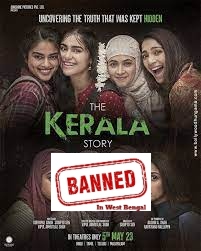

By A Special Correspondent
First publised on 2023-05-09 07:06:29
The West
Bengal government has banned the controversial film The Kerala Story in the
state. It was running on 94 screens in the state and has been withdrawn with
immediate effect. The state government has said that the scenes and the story
of the movie, allegedly defaming one community, can cause disharmony
between communities and may even cause riots. Hence as a matter of abundant
precaution, the film was not being allowed to be screened in the state. The film was
earlier taken down by the distributors in Tamil Nadu and made tax-free in
Madhya Pradesh.
This once
again shows that politicians with whatever ideology - Left, Right or Centre - are not immune from the disease of banning films, books, works of art or even
lectures, comedy shows and the like as per their personal preferences. The Modi
government was rightly taken to task by the opposition for banning the BBC documentary
on the Gujarat riots. But by banning The Kerala Story, opposition-ruled states
have shown they are also the same. Any film that has been certified for public
viewing by the CBFC should ideally be allowed to be screened in an unrestricted
manner.
The film is
being screened all over the country, even Kerala, without any report of any disturbances.
It is a fictionalized version of what the makers claim to be true events. The
reviews are not good with most critics calling it a badly-acted rant. It is
upon the viewer to decide if the film deserves to be seen. They must be given
the choice to see it. Banning anything is not a solution and the earlier
politicians understand it the better. If democracy thrives when different
voices are allowed to be raised and if the Modi government is rightly
criticized for suppressing dissent, the banning of The Kerala Story in West Bengal
shows that deep inside, most politicians do not want to hear or see something they do
not like and use their power to to stop their constituents from seeing or hearing the same.











